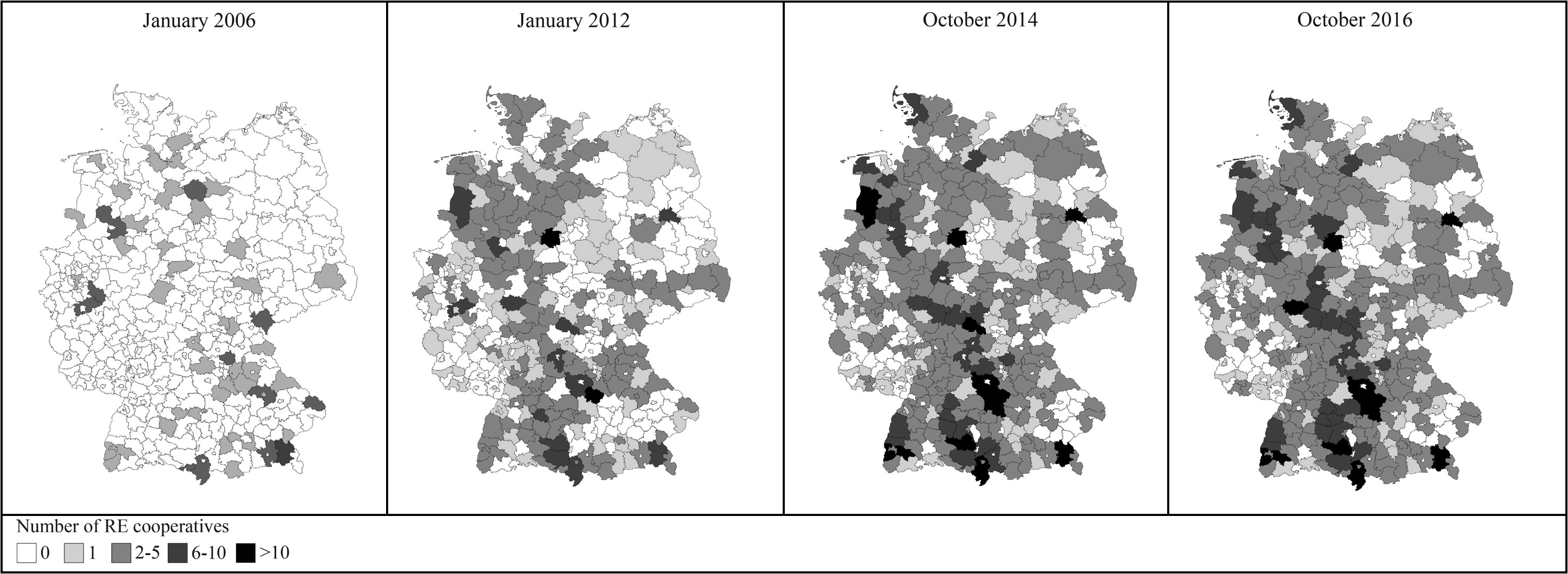News
Cooperative minds think alike
REScoops (Renewable energy cooperatives) are pivotal in the German Energiewende. Yet, little is known about the local factors that explain their emergence. New research by Utrecht University’s researchers Matthijs Punt, Thomas Bauwens, Koen Frenken and researcher Lars Holstenkamp from ECOLOG-Institute of Social-Ecological Research & Education and Leuphana University Lüneburg, sheds light on the role of local institutional contexts in fostering the creation of REScoops in Germany.
REScoops have been pivotal in the ‘Energiewende’ or energy “turn around”, the German shift to renewable energy in electricity systems. They have been argued to stimulate investments in renewables production at the community level and to contribute to the social acceptance of renewable energy technologies, due to their democratic and participatory features. The implementation of favourable financial support instruments, such as the feed-in tariff, are commonly cited as an important factor to explain the emergence of REScoops in Germany. Yet, much less is known about the local factors that foster this emergence, especially the level of legitimacy gained by the cooperative model within society. A new paper by Matthijs Punt and colleagues examines the role played by socio-political legitimacy of the cooperative model in boosting the local creation of REScoops, relying on a quantitative analysis of the evolution of all German REScoops between 2006 and 2016.

Higher legitimacy boosts new REScoops
A major finding of this study is that the local presence of cooperatives in other industries supported the founding of REScoops. “In regions where more cooperatives are being founded, people are more likely to be familiar with the cooperative model and to be aware of its economic and social benefits”, explains Matthijs Punt, lead author of the study and researcher at Utrecht University. The researchers also show that in particular the local presence of cooperative banks had a positive effect on the foundings of solar energy cooperatives. Indeed, cooperative banks are obviously familiar with the organizational and legal details of the cooperative form and are more likely to financially support the founding of REScoops.

Overall, this demonstrates that REScoops can leverage the socio-political legitimacy gained locally by the cooperative model in other industries. “This highlights the importance of the wider cooperative movement for REScoops”, says Lars Holstenkamp, researcher at ECOLOG Institute and Leuphana University Lüneburg. Moreover, such types of ‘legitimacy spillovers’ turn out to be more important than other factors, such as climatic conditions or the share of regional votes going to the green party, in explaining the creation of REScoops.
Context matters
The results are relevant to the wider debate around the success of cooperatives in market economies. It casts a critical light on standard economic theory, which explains the low presence of cooperatives in most markets as evidence for their inefficiency relative to their investor-owned counterparts. Standard theory neglects the local context in which organizations operate, which turns out to be crucial to explain the choice of organizational forms. What is more, it neglects the active role citizens can play in founding cooperatives.
The success of a cooperative and, particularly, a REScoop cannot be considered in isolation and the interactions that it maintains within its local context should be considered. “Cooperative businesses are most successful when they ‘run in packs’ and form industrial or regional clusters”, says Thomas Bauwens, co-author and community energy expert at Utrecht University. Well-known examples of such phenomenon are the Mondragon cooperative group in the Basque region of Spain and the clusters of social cooperatives in Northern Italy. “We hope that our findings shed new light on this important debate on organizational diversity in market economies”, concludes Koen Frenken, Professor at Utrecht University.
Publication: Punt, M.B., Bauwens, T., Frenken, K., Holstenkamp, L., 2021. Institutional relatedness and the emergence of renewable energy cooperatives in German districts. Regional Studies 0, 1–15. https://doi.org/10.1080/00343404.2021.1890708